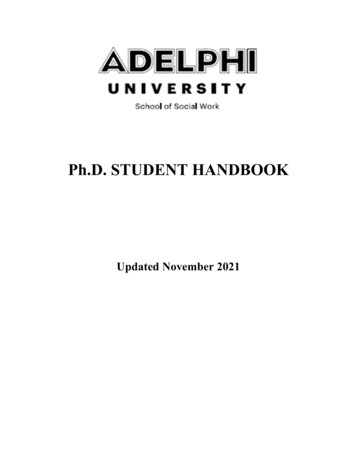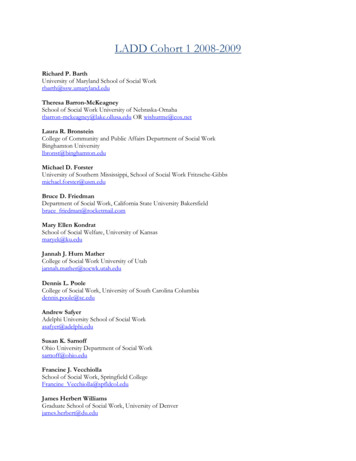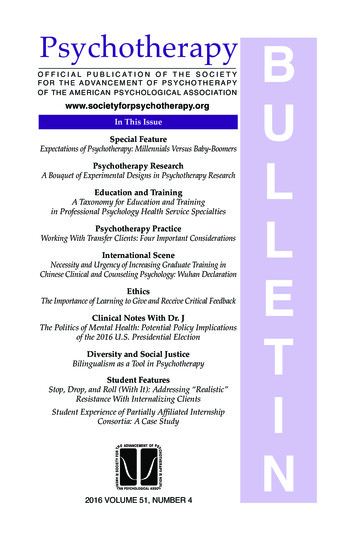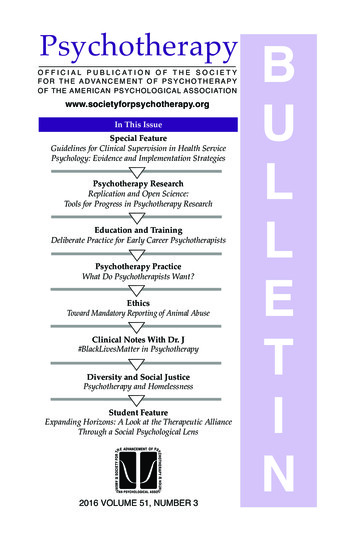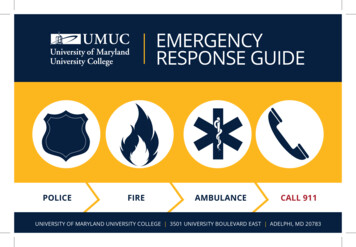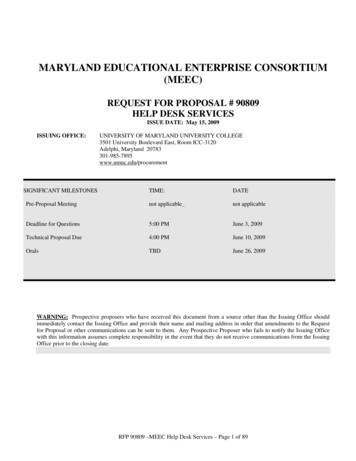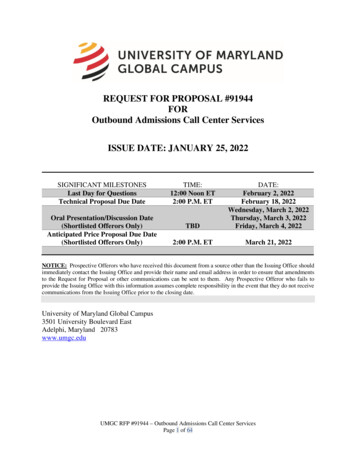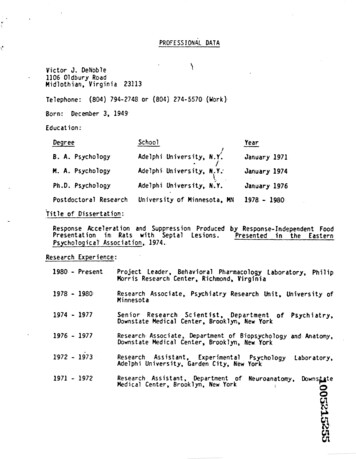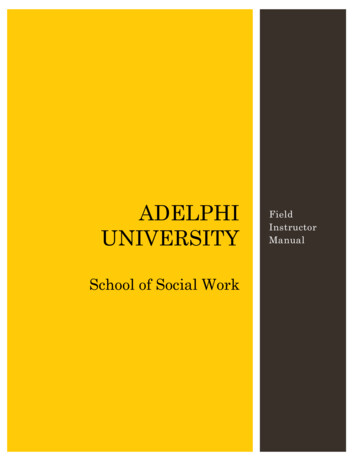
Transcription
ADELPHIUNIVERSITYSchool of Social WorkFieldInstructorManual
School of Social Work Field Instructor ManualTABLE OF CONTENTSPurpose of theManual . .4Holidays andVacations . . 7AgencyOrientation. 8Mission, Vision andDeclaration of Values .4Inclement WeatherPolicy.7Who’s Who in FieldEducation . .4Student Absence .8Student PerformanceExpectations . .9Placement Planning &Matching Process .5Release Time from FieldWork . .8Academic Privileges for FieldInstructors 5Malpractice InsuranceCoverage 8Field EducationCalendar 6Identification of StudentStatus . .8Field Schedules & MinimumRequirements . .6Home Visits andSafety .8Attendance Sheet andVerification . .7Transportation andReimbursement. . 82 PageLearningAssignments . .9Four Week EducationalPlan 10Challenges StudentsEncounter in thePracticum .10Evaluations. . 10Grading for the FieldPracticum 11Appendix 11
School of Social Work Field Instructor ManualField Education Department Contact InformationField Education DepartmentNameTitleCampusPhone #Fax #E-mailTBADirector of ivia 16-8774376James Dr. AlissaMallowPhyllisCampagna3 PageAssistantDirectorext rativeAssistantGardenCity516-2378609845-4713348ext allow@adelphi.educampagna@adelphi.edu
School of Social Work Field Instructor Manual This Field Instructor Manual is designed to serveas a guide and resource for Field Instructors andAgency Educational Coordinators. The manualhighlights important information about field workpolicies and practices for Adelphi UniversitySchool of Social Work. This manual is alsoavailable along with other field education formsonline. 1. Mission, Vision and Declaration ofValues Professionalism: We will striveto be reliable, competent, andpoised in our business matters.Interpersonal Intelligence: Wewill make an effort tounderstand and interacteffectively with others.Efficiency: We will operate in anorganized manner to achievework goals with minimumwasted effort or drain.Commitment: We will be faithfulto the value system of theprofession and the NASW Codeof Ethics at all times and in allaspects of our work.Communication. We will relayaccurate information ina uniformed and timely manner.2. Who’s Who in Field Education1.1. The Field Education Department iscommitted to student-centered serviceand providing students with quality fieldpracticum experiences that enable themto develop the knowledge, skills andvalues required for steadfast fidelity toprofessional social work practice.1.2. Our vision is to service studentsefficiently and in a friendly manner. Inaddition, we aspire to develop studentswho are sought after in the social workpracticum as well as the marketplacebecause of their strong professionalidentity and technical skill as well as theirability to appreciate and respond toethical matters in day-to-day practice.1.3. In the quest for excellence, the FieldEducation Department expects everyonewith interest or concern in the field courseof study to pledge to the following values.We aim to deliver on these expectations: Accountability: We will do whatwe are supposed to do by whenwe are supposed to do it andare prepared to justify ouractions if called to task.4 Page2.1. Director of Field Education: The chiefadministrator at the School who is responsible formanaging the multi-campus field educationprogram.2.2. Assistant Director of Field Education:Administrators located at each campus. They areresponsible for the day-to-day management ofthe School’s field education program at theirrespective sites. This includes the placementplanning process.2.3. Faculty Field Liaison: Full-time or adjunctfaculty member who is assigned by the FieldEducation Department to serve as the gobetween the School of Social Work and hostagencies. Responding to all student contactswithin a reasonable timeframe. Visiting students’ field placementagencies at least once per semester tomeet with the Field Instructor and otherrelevant agency personnel. For 21-hourstudents, one visit is required in the falland one in the spring. For 14-hourstudents, one visit is required in the fall,spring and summer semesters. These
School of Social Work Field Instructor Manual visits are to take place during the first halfof each semester.Examiningstudents’FourWeekAssignment & Learning Plan andcommunicating with students and FieldInstructors, as necessary, regarding workpracticum.Follow up with students and FieldInstructors regarding any complaints orreports of unsatisfactory performance inthe field.Evaluating students’ performance in thefield practicum based on verbal andwritten evaluations from the FieldInstructor.Assigning a grade in accordance with theevaluation from the Field Instructor aswell as their overall impression of astudent’s learning and performance inthe field practicum.2.4. Field Instructor: A social worker who holds aMaster of Social Work degree from a CSWEaccredited university as well as a social worklicense and is SIFI certified. Field Instructors aredesignated by the agency or the school and carryresponsibility for training and supervisingstudents. Field Instructors’ responsibilitiesinclude: Conducting weekly individual and/orgroup field instruction conferences for aminimum of one hour.Selectingappropriatelearningassignments based on the student’seducational level.Monitoringandcoordinatingthestudent’s work in the agency setting.Readingthestudent’sprocessrecordings and then offering constructivefeedback to the student.Conducting formative and summativeevaluationsofthestudent’sperformance.5 Page Conferring with the student’s FacultyField Liaison.2.5. Task Instructor: In some agencies, a studentmay be assigned to a task instructor. A taskinstructor need not be a social worker, but maywork in a related discipline. A task instructorprovides guidance to the student in carrying outspecific learning assignments.3. Placement Planning & Matching Process3.1. All agencies require students to interview forthe practicum. Agencies decide whether toappoint a student.After the interview iscompleted, the student must contact the FieldEducation Department to discuss the interview.The agency will inform the Department and/or thestudent regarding acceptance. If the agencycontacts the student regarding the decision, thestudent must contact the Field EducationDepartment to relay the information.4. Academic Privileges for Field Instructors4.1. Field Instructors are entitled to the use of theAdelphi University library. They may request aletter from the Field Education Department toobtain a temporary user card.4.2. Field Instructors are considered adjunctinstructors in the School of Social Work. This titlehas no tenure implications, offers no nt with the School of Social Work oruniversity.4.3. Agencies whose professionals provide fieldinstruction sufficient to enable a student to satisfycredit bearing course requirements shall beawarded tuition remission credits on the followingschedule: one-half (.50) credit per semester fieldinstruction of a junior student. one credit (1.0) credit per semester fieldinstruction of a senior student or MSW student.
School of Social Work Field Instructor Manual4.4. Tuition remission is granted to an agencyand may be assigned to an employee of theinstitution (but not members of their families)only with the written approval of both theinstitution's Director (or designee) and theSchool of Social Work.4.5. Individuals are limited to a maximum of 6credits of tuition remission in any one semester.Tuition remission credits expire two years fromthe date they are earned. Agency employees mayuse tuition remission to a maximum of 50% of thetotal credits taken during any given semester.Remission is accepted on a first come, firstserved basis. When the School's annual ssing agency tuition remission.4.6. Tuition remission is rendered in the form ofan approved Application for Tuition Remissionthat is valid only when signed by a designatedofficial of the agency and the School of SocialWork. Contact the Budget Director at the Schoolof Social Work: 516-877-4383 to request anapplication. Only the original approvedApplication for Tuition Remission shall beaccepted by the University for satisfaction oftuition charges.4.7. Tuition remission applies to tuition only;recipients of approved tuition remission remainresponsible for all other fees associated withcourse registration. Tuition remission credits donot apply to persons who are employed full-timeby Adelphi.4.8. Tuition remission credits may be used for anycourse offered by the university providing that theagency employee meets the admissionrequirements for the course. For ContinuingEducation Certificate programs remission mustsatisfy up to 30% of the program cost persemester up to a maximum of 6 graduate creditequivalent.4.9. There is a processing fee of 25 to apply fortuition remission credits.Checks mustaccompany the application form.6 Page5. Field Education Calendar5.1. Students and Field Instructors shouldfamiliarize themselves with the Field EducationCalendar. The calendar may be found online.5.2. Students do not end their field course whenthe minimum number of hours are completed, butremain in placement until the last day of field fortheir educational path.5.3. Students may not begin the placement priorto the first day of field. However, students mayattend an agency orientation prior to the first dayof field. When that is the situation, orientationhours are counted towards the student’s totalearned hours for the semester.5.4. Students placed in school settings arerequired to complete a minimum of 18 hours aweek and remain in placement from Septemberthrough the end of June, if necessary to completethe minimum number of hours required OR ifmandated by the agency at the time ofassignment.6. Field Schedules & Minimum Requirements6.1. Students are expected to attend their fieldcourse for a specified minimum number of hoursduring the academic year. The required numberof annual hours is based on the student’seducational level.
School of Social Work Field Instructor Manual6.2. A “standard” day consists of 7 field workhours and 1 hour for a meal/break, which is not tobe included in the accumulation of field hours.6.3. Students are required to adhere to a setweekly field course schedule.6.4. Once the schedule is created and approvedby the Field Instructor any changes to the setdays and/or times must be approved by theField Instructor and then by the Faculty FieldLiaison.6.5. Any increase in the number of hours over 5hours per week must be agreed upon by the FieldInstructor and the Faculty Field Liaison, and thenapproved by the Director of Field Education.6.6. Students who wish to change theircontracted field hours (e.g., from 14 hours to 21hours, or 21 hours to 14 hours) must first obtainapproval from both their Field Instructor andFaculty Field Liaison.6.7. Field work hours may not be front loaded.Any hours above and beyond the requirednumber for each semester will not be carried overor maintained from semester to semester or yearto year.to field. The student, Faculty Field Liaison, andField Instructor must ensure that the minimumnumber of hours for field practice are completedfor each semester.8. Holidays and Vacations8.1. There are no personal or vacation days forinterns.8.2. Students placed in a school setting adhere tothe school’s calendar, not the Field EducationCalendar.8.3. If there are many agency closings due toholidays the student, Field Instructor and FacultyField Liaison should immediately collaborate tocreate a schedule for the student to make uphours.8.4. Students do not go into field during theWinter Break (i.e. between Christmas and NewYear's) because the University is closed.Students attend field course during the month ofJanuary (inter-session). With the FieldInstructor’s permission, spring break may beused to make up hours if needed; however, thattime may not be used to accrue extra hours.9. Inclement Weather Policy7. Attendance Sheet and Verification7.1. Students are to record the total number ofhours spent in their field course each day on theAttendance Sheet and have their Field Instructorcertify their attendance by signature. At the endof each month, students submit their AttendanceSheet by email to the Faculty Field Liaison whowill officially document the hours with the FieldEducation Department. The Faculty Field Liaisonwill verify that the student is on track to earn therequisite number of hours. If a student is behindin hours at any time the Faculty Field Liaison,Field Instructor and the student will work togetherto create a plan to make up the missing hours.7.2. Students must make up any time fallingbelow the requirement because of holidays,illness, snow days, emergencies, or delayed start7 Page9.1. In the event of inclement weather,attendance is determined by the agency.However, students are encouraged to use theirjudgement about traveling.9.2. Students and Field Instructors may preparefor a possible snow day by speaking in advanceto develop a contingency plan that would go intoeffect if there is storm. This preparation will helpstudents fulfill their professional obligation ofproviding services to clients.9.3. In the event of absence due to inclementweather, the student, Field Instructor and FacultyField Liaison should immediately collaborate tocreate a schedule for the student to make uphours.
School of Social Work Field Instructor Manual10. Student Absence10.1. Students MUST notify their Field Instructorand Faculty Field Liaison in advance of anyunplanned or upcoming absences from the fieldcourse.10.2. Students must make up any time fallingbelow the requirement because of holidays,illness, snow days, emergencies, or delayed startto field. The student, Faculty Field Liaison, andField Instructor must ensure that the minimumnumber of hours for field practice are completedfor each semester.10.3. If a student leaves the practicum earlierthan the specified end date, the student may losethe placement and forfeit their hours.14.2. The following safety guidelines should beconsidered when planning student involvement inhome or community visits. The Field Instructorshould speak with the student about the followingsafety guidelines: 11. Release Time from Field Work11.1. A small number of field work hours may beearned through attendance at Social Action Dayor involvement in school endorsed relevantevents. 12. Malpractice Insurance Coverage12.1. All students enrolled in field instruction arecovered by the University for ProfessionalLiability.13. Identification of Student Status13.1. Students must identify themselves asstudents or interns when in the field course.14. Home Visits and Safety14.1. If students are assigned home orcommunity visits, agencies are expected to takeappropriate measures to ensure the safety ofstudents. Any concerns the student has regardinghome/ community visits should be discussed withthe Field Instructor. If the issue is not resolved,the student should speak with the Faculty FieldLiaison and the Field Education Department.8 Page Visit between the hours of 9:00 a.m. and4:00 p.m.Visit with an escort or co-worker.Inform the Field Instructor of the time andlocation of the home visit.Plan a route in advance.Use main streets for traveling on foot.Ride in the middle car or where theconductor is present when traveling bytrain.Meet a client in a community meetingplace (e.g., church, community center) ifit is appropriate and feasible for theclient.If it is unsafe to enter a building alone,ask the client to meet you at the frontdoor of the building and accompany youto the apartment.Use caution when entering elevators andstairwells.Carry official identification or a letter thatestablishes your status as an agencyrepresentative.Bring a charged cell phone.Use care in carrying bags and do notwearing expensive jewelry.15. Transportation and Reimbursement15.1. Agencies are expected to reimbursestudents for expenses incurred as part of any fieldassignment, if they similarly reimburse staff.15.2. Students should not use their own vehicleto transport clients.15.3. Students may drive an agency-ownedvehicle if they have the appropriate license andagency approval.
School of Social Work Field Instructor Manual16. Agency Orientation16.1. An orientation program in the agencyshould be viewed as an ongoing process duringthe first few weeks in placement, concurrent .2. An orientation to the agency should includea review of: Agencymission,goalsandorganizational structure.The program where the student will beassigned.Agency policies and proceduresincluding dress code, social mediapolicy and the use of other technology(e.g. audio taping meetings orsessions).Role and responsibilities of the student inthe agency setting.Role and responsibilities of the FieldInstructor and Task Instructor (ifapplicable). Education. Write process recordings weekly for theField Instructor and submit two of theseprocess recordings to the Faculty FieldLiaison each month.Abide by the agency’s policies andprocedures.Demonstrate competencies for theireducational level.17.2. When students demonstrate inappropriateperformance or behavior within field education,the Field Education Department utilizes arestorativeapproachbasedupontheTranstheoretical Model of Change (Prochaska &DiClemente, 1983) to assist students inestablishing suitability for the social workpracticum / profession.18. Learning Assignments18.1 The Council on Social Work Education(CSWE) requires students to develop thefollowing competencies in the social workpracticum:17. Student Performance Expectations17.1. Students are expected to: Attend the field course regularly and ontime.Remain at the agency that has acceptedthe student, for the academic year.Changing agencies is not permitted.Read and abide by the NASW Code ofEthics.Adhere to social media ethics andetiquette.Maintain a professional demeanor.Display honesty and integrity.Demonstrate dependability andengagement in learning.Respond to supervision and feedback.Recognize their limits and when to seekhelp.Interact effectively and respectfully withothers.9 Page18.2. Learning activities should be congruent withthe student’s educational level. See Appendix Bfor suggestions on developing field coursepractice assignments according to studenteducational level.18.3. Process recordings are required. Processrecordings are educational tools utilized by socialwork schools to teach students how to:
School of Social Work Field Instructor Manual Describe and reflect on their work.Record and examine their thoughts andfeelings.Analyze their work with clients.See Appendix A for suggestions on helpfulcomments in facilitating learning around processrecordings. If there are questions, FieldInstructors are encouraged to speak with theFaculty Field Liaison and/or the Assistant Directorof Field.18.4. Students are also to participate in weeklyindividual and/or group field instructionconferences. The focus of these sessions shouldbe to help students integrate theory and practiceand to improve their skills. See Appendix A forsuggestions on helpful questions to facilitatediscussion and learning during field instruction.18.4. If the Field Instructor is using a group formatfor field instruction and needs to address asensitive topic with a particular student, then anindividual session would be required.18.5. If the Field Instructor is using a group formatfor field instruction and a student requests anindividual session, the Field Instructor shouldoblige.19. Four Week Educational Plan19.1. During the first four weeks of the practicumthe Field Instructor and student should discussand plan the details of learning activities thestudent will engage in during the course of theacademic year.19.2. The Field Instructor sends the Four WeekEducational Plan by the fourth week of thepracticum to the Faculty Field Liaison.19.3. This form helps the Faculty Field Liaisonand the Field Education Department know whattypes of learning activities the student will beengaged in and if the School can assist withfurther educational planning.10 P a g e20. Challenges Students Encounter in thePracticum20.1. The Field Education Department haspolicies and procedures to identify and correctchallenges students may encounter in theirpracticum. Students who are experiencingdifficulty in the practicum should do the following: First speak with their Field Instructorabout the matter.If the matter is not resolved by the FieldInstructor, the student should contact theFaculty Field Liaison.If the matter is not resolved by theFaculty Field Liaison in a timely fashion,the student should speak with theAssistant Director of Field Education.If the matter is not resolved in a timelyfashion by the Assistant Director of FieldEducation, the student should speakwith the Director of Field Education.21. Evaluations21.1. The Field Instructor is to monitor thestudent’s learning and provide ongoingappreciative and constructive feedback.21.2. At the end of each semester the FieldInstructor and student should discuss andprepare an evaluation of the student’sperformance.Following are steps in theevaluation process: The student and Field Instructor shouldmeet to review and discuss theevaluation.The Field Instructor is to complete a draftof the evaluation following the evaluationconference.The student should read, reflect on, andassimilate the content.The Field Instructor and student shouldmeet together to review the “final”evaluation draft.If objections or differences are raised andthe Field Instructor agrees, then changes
School of Social Work Field Instructor Manualshould be made to the evaluation. If, The Field Instructor is to provide a finalhowever, the Field Instructor does notcopy of the evaluation to the student.agree, the student may choose to The student and the Field Instructorprepare and submit a rebuttal /addendumshould provide a copy to the Faculty Fieldto their evaluation.Liaison. Signing the evaluation indicates the22. Grading for the Field Practicumstudent has read the document. If thestudent is not in agreement with the22.1. Field instruction courses are gradedevaluation, the Field Instructor shouldPass/Fail.note that at the end of the document. While field evaluations do not include22.2. Ultimately, the Faculty Field Liaison hasrecommendations for a grade of Pass ordecision-making responsibility for grading theFail, the final grade is determined instudent.collaboration with the Faculty FieldLiaisonAPPENDIX A – Helpful Comments for Field Instruction and Process RecordingsQuestions to Elicit Information for Field Instruction and SupervisionThese sentence stems can be helpful to elicit information from students about client cases and theirunderstanding of casework and concepts: Tell me about Give me an example of What Explain Describe. How would you In what ways If you could In what circumstances Questions that Probe for Reasons and EvidenceAs the Field Instructor is reviewing the process recordings and facilitating the field instruction conferencethe following questions may be used to develop the student’s self-awareness, integrate theory with practiceand properly plan appropriate interventions with clients.Questions of ClarificationQuestions that ProbeAssumptionsQuestions that Probe Reasons andEvidenceWhat do you mean by ?What are you assuming?What would be an example?What is your main point?What is Jenny assuming?How do you know?How does relate to ?What could we assume instead?Why do you think that is true?Could you put that another way?You seem to be assuming .Do I understand you correctly?Do you have any evidence for that?11 P a g e
School of Social Work Field Instructor ManualIs your basic point or ?All of your reasoning depends on What difference does that make?the idea that . Why have youbased your reasoning onWhat do you think is the main issueWhat are your reasons for saying that?instead of ?here?What other information do you need?Let me see if I understand you; do you You seem to be assuming .How do you justify taking that for Could you explain your reasons to us?mean or ?granted?How does this relate to ourAre these reasons adequate?Is that always the case? Why doproblem/discussion/issue?you think the assumption holdsWhy do you say that?here?What do you, Mike, mean by thisremark? What do you take Mike toWhat led you to that belief?Why would someone make thatmean by his remark?assumption?How does that apply to this case?Jane, can you summarize in your ownwords what Richard said? . . . Richard, isWhat would change your mind?this what you meant?But, is that good evidence for thatCould you give me an example?belief?Would this be an example, . . .?Is there a reason to doubt thatevidence?Could you explain this further?Would you say more about that?Why do you say that?Who is in a position to know that istrue?What would you say to someone whosaid that ?Can someone else give evidence tosupport that view?By what reasoning did you come to thatconclusion?How could we find out if that is true?12 P a g e
School of Social Work Field Instructor ManualQuestions about Viewpoints orPerspectivesThe term "imply" will require clarification whenused with younger students.Questions that Probe Implicationsand ConsequencesQuestions about the QuestionHow can we find out?How can we find out?What does this question assume?What does this assume?What are you implying by that?Would ask this question differently?Would put the question differently?When you say , are you implying ?How could someone settle this question?But, if that happened, what else would happenas a result?What effect would that have?Would that necessarily happen or onlypossibly/probably happen?Can we break this question down at all?Is this question clear? Do we understandit?How could someone else settle thisquestion?Can we break this question down at all?Is the question clear? Do we understand it?Is this question easy or hard to answer?Why?Is this question easy/hard to answer? Why?Does this question ask us to evaluatesomething? What?Does this question ask us to evaluatesomething?Do we all agree that this is the question?Do we all agree that this is the question?To answer this question, what otherquestions must we answer first?To answer this question, what questionswould we have to answer first?I'm not sure I understand how you areinterpreting this question. Is this the sameas ? How would state theissue? Why is this issue important? Is thisthe most important question, or is therean underlying question that is really theissue?I’m not sure I understand how you areinterpreting the main question at issue. Isthis the same issue as ? How wouldput this issue?What is an alternative?If and are the case, then whatmight also be true?If we say that is ethical, how about ?Why is this question important?Source: Paul, Richard, Critical Thinking: How to Prepare Students for a Rapidly Changing World, 1993.13 P a g e
School of Social Work Field Instructor ManualAPPENDIX B. FIELD COURSE PRACTICE ASSIGNMENT EXAMPLES ACCORDING TO EDUCATIONAL LEVELBSW juniors must work closely with social workers and other professionals in the field coursesetting and be engaged in the following types of learning assignments: Make appropriate referrals for professional and community services Example: Student will make referral for SNAP Benefits & Food Program (The SupplementalNutrition Assistance Program) by filling out the application with the client and accompanyingthe client to any necessary appointments at the local SNAP Benefits Office. Coordinate services for individuals, groups, families, and communities Example: Student will locate and identify a parenting skills program accessible to the client andprovide a written referral to connect the client with the services. Student in a nursing homesetting will make arrangements for home health care service provision for clients beingdischarged post-hip replacement surgery. Follow up to assure that services were provided and that conditions improved Example: Student will schedule and make follow up appointments and follow up phone calls oneweek after referrals for services. Provide other non-therapeutic assistance to individuals, families, groups, and communities Example: Student will develop and sustain working alliances with clients by relating authentically(genuinely) with clients. Student’s expressions will be spontaneous rather than contrived. Facilitate the admission/service process Example: Student will make phone calls connecting clients to a service provider (e.g., apsychotherapist), and help the client initiate and follow through with the intake process. Contribute to the development of and participate in psychoeducation programming and recreationalinterventions Example: Student will co-facilitate the following group for teenagers: “Alternatives to Joining aGang.” Advocate for individuals, groups, families, and communities Example: Student will accompany client to Housing Court to help client maintain housing. Fundraise and write grants Example: Student will assist supervisor in writing grants through researching available fundingsources online or at the library. Get involved
School of Social Work Field Instructor Manual 4 P a g e This Field Instructor Manual is designed to serve as a guide and resource for Field Instructors and Agency Educational Coordinators. The manual highlights important information about field work policies and practices for Adelphi University School of Social Work. This manual is also


